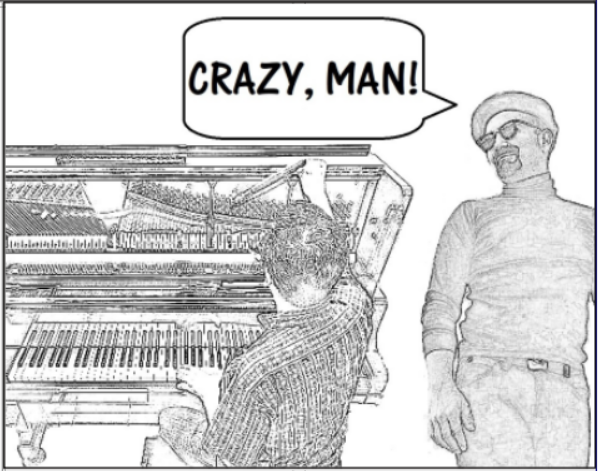It is easy to be impressed by jazz musicians… if you are not one yourself. We are, after all, an impressive bunch. And I know what you’re thinking when you see us up on stage: Am I watching mere mortals, or have the very gods themselves descended from Olympus to bless us with their musical gifts?
Yep, we sound great. One might even say perfect. But I’m about to divulge an inside secret. Jazz musicians screw up all the time. But you might not actually notice, and I’m going to tell you why. It should be no surprise that people make mistakes whilst doing their jobs. But some jobs are more high-stakes than others. If, for example, a brain surgeon screws up badly enough, someone’s probably dead, and it will likely make the papers, and then the courts. But if a musician screws up, the only thing that gets hurt is our ego. And because no one is directly affected by our momentary lapses in musical precision, these blunders are actually quite easy to cover up.
At this point, the more artistically minded of you might be thinking, What’s the big deal? This is art. Mistakes are part of the beauty of performance, and wrong notes are an intrinsic fabric in the rich tapestry of improvised music. Let me tell you—anyone who’s thinking “there ain’t no wrong notes in jazz” never heard me play an early Sunday bunch gig with a hangover.
The good news is, if a jazz musician makes a mistake while performing, there’s a host of ways we can cover it up without the audience even realizing. So here we go with the Professor’s guide to concealing your jazz gaffs:
1. do it again. If you play a note that sounds really bad, play it again. The audience will assume that you meant to do it. (Art is subjective after all.)
2. fiddle with your instrument. Yes this is childish, but so is playing music for a living. If you screw up; keep going and finish your solo, but when you’re done, scrunch up your face in an expression or frustration and pretend to adjust your sax/trumpet etc. This will give the impression the bad solo was no fault of your genius; but poor workmanship on the part of your instrument repairer, whom you will assuredly call up and fire as soon as this song has finished.
3 . blame the sound guy (this is a great one for vocalists). With a vast array of technical equipment on the stage, from microphones to amplifiers and monitors, there are endless excuses for a bad performance just waiting to be exploited. “I couldn’t hear myself,” “The bass was too loud,” and “The EQ on my monitor is unbalanced,” are just a sample of valid-sounding complaints to be hurled at the sound guy at any given moment. Make sure when you communicate these grievances, do it on stage with exaggerated facial expressions so the audience truly knows the sound guy has not only ruined your performance, but denied everyone some of your truly transcendent musical moments.
. blame the sound guy (this is a great one for vocalists). With a vast array of technical equipment on the stage, from microphones to amplifiers and monitors, there are endless excuses for a bad performance just waiting to be exploited. “I couldn’t hear myself,” “The bass was too loud,” and “The EQ on my monitor is unbalanced,” are just a sample of valid-sounding complaints to be hurled at the sound guy at any given moment. Make sure when you communicate these grievances, do it on stage with exaggerated facial expressions so the audience truly knows the sound guy has not only ruined your performance, but denied everyone some of your truly transcendent musical moments.
4. the audience doesn’t get it (this ties in with number 1) if you play badly enough and consistently enough, the audience will start to question if they are the problem for not “getting it” (I call this the Woody Allen strategy).
5. play dead. I know, even for me, this one’s a bit much. It’s a “break glass in case of emergency” kinda strategy. If you really screw up badly, clutch your chest feigning pain, and fall to the floor remaining motionless. After a minute or so, people will scramble to call paramedics, during which time, you can pack up your horn and sneak out unnoticed amongst the chaos. Is playing dead dignified? No. But possums do it, and everybody fine with possums. Added bonus: ticket sales for your next performance will skyrocket, as people will be curious if you will survive your next gig.
So, that’s it. I know I’ve let the side down a bit by divulging this trade secret, but perhaps we’ve been resting on our laurels for too long now. So if you see me on stage after a solo, fiddling with my clarinet or giving the sound guy a dirty look, you can rest assured I screwed up badly, and probably not even the first time in that song. And you can then thank the gods I’m not a brain surgeon.
Reedman extraordinaire Adrian Cunningham is the leader of Professor Cunningham and his Old School Jazz Band, based in New York City. Adrian Cunningham was voted in a 2017 Hot House Jazz Magazine readers’ poll the Best Alto Sax Player in New York. His most recent album is Duologue, issued on the Arbors Jazz label. Visit him on the world wide web: www.adriancunningham.com.





















